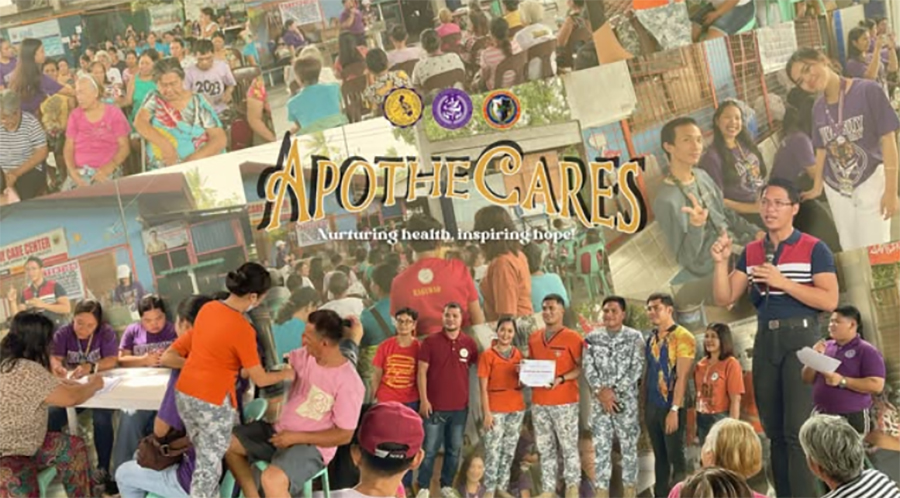By Jasmine Ysabelle A. Sitchon
In collaboration with the College of Pharmacy Student Council and the Western Visayas Coast Guard, a community outreach program on family planning and proper medication use was conducted to empower communities with accurate healthcare information.
Brgy. Lanit, Jaro, Iloilo City on March 22, 2025—In an effort to promote informed health choices and responsible family planning, 2nd-year pharmacy students from the College of Pharmacy, Central Philippine University (CPU), under the instruction of Prof. Sarex Dalida Dipol Jr., conducted an outreach program in Barangay Lanit, Jaro, Iloilo City. The event, themed “ApotheCARES: Family Planning and Health Initiative,” was a collaborative effort with the College of Pharmacy Student Council, led by Jasmine Ysabelle Sitchon, BM for the Ministry of Outreach and External Affairs, to educate the community about family planning methods and the proper use of medications. The program also featured a free vital signs check-up, facilitated by the Philippine Coast Guard, with the assistance of CPU 2nd-year pharmacy students and the student council. The programme also featured discussion from Mr. Karl Timaan, RSW, and Prof. Ma. Jean Amistas, RPh, LPT, and Vice Governor Princess Samantha Joy Suarez, who highlighted the importance of making informed health decisions.
Indigenous populations frequently encounter specific obstacles in obtaining healthcare services, making family planning and appropriate medication usage vital to their overall health. Understanding that family planning is a vital aspect of public health. During this portion of the event, Mr. Karl Tima-an, RSW, guided residents through the different natural and modern methods available. They explained that family planning is not just about birth control but about making responsible decisions for a healthier future. Natural methods such as the calendar method, basal body temperature tracking, mucus observation, and the withdrawal method were discussed, along with modern contraceptive options like pills, injectables, implants, intrauterine devices (IUDs), condoms, and permanent procedures such as tubal ligation and vasectomy. Beyond the medical aspects, Mr. Karl Tima-an, RSW, emphasized the long-term benefits of family planning—ensuring safer pregnancies, healthier children, financial stability, and improved overall well-being for families. By giving couples the power to decide when and how many children to have, they can better provide for their family’s needs and contribute to a more sustainable community.
Alongside family planning, the outreach program also tackled another pressing health issue: medication safety and common drug misconceptions. The discussion was led by Vice Governor Princess Samantha Joy Suarez, who emphasized the dangers of self-medication and the misuse of common drugs. Many Filipinos self-medicate, often taking antibiotics for colds and flu or stopping treatment as soon as they feel better—actions that can lead to antibiotic resistance and more severe health problems.
A significant number of indigenous individuals depend on traditional healing practices, which can be beneficial but might occasionally conflict with contemporary medical treatments. Vice Governor Suarez stressed the importance of completing prescribed medications, seeking professional advice before taking any drug, and avoiding self-prescription of pain relievers, herbal medicines, and other over-the-counter treatments without medical supervision. She reminded the attendees that incorrect medication use can lead to serious complications, including drug resistance and organ damage. By providing clear and accurate information, the CPU pharmacy students aimed to empower residents to take control of their health through proper medication use, reducing the risks of drug resistance and complications.
To ensure residents could apply what they learned, the program also provided guidance on where to access free family planning services. The students shared that barangay health centers offer free pills, injectables, condoms, and IUDs, while public hospitals provide permanent contraception options like tubal ligation and vasectomy. Additionally, non-governmental organizations (NGOs) are available to assist with education and resources. Residents were encouraged to visit health professionals for consultations, ensuring they receive the best method suited to their needs and lifestyle. By connecting the community with available healthcare services, the program bridged the gap between awareness and action.
This initiative was met with enthusiasm from barangay officials and residents, who expressed their gratitude for the valuable insights and practical health guidance. Recognizing the impact of health education, the College of Pharmacy Student Council affirmed their commitment to expanding their outreach efforts to other communities. Through initiatives like “ApotheCARES: Family Planning and Health Initiative,” CPU continues to uphold its mission of serving communities, promoting health awareness, and ensuring access to accurate medical information. By equipping families with the right knowledge, the university plays a crucial role in building a healthier, more informed society for generations to come, empowering indigenous families to make informed health choices.

